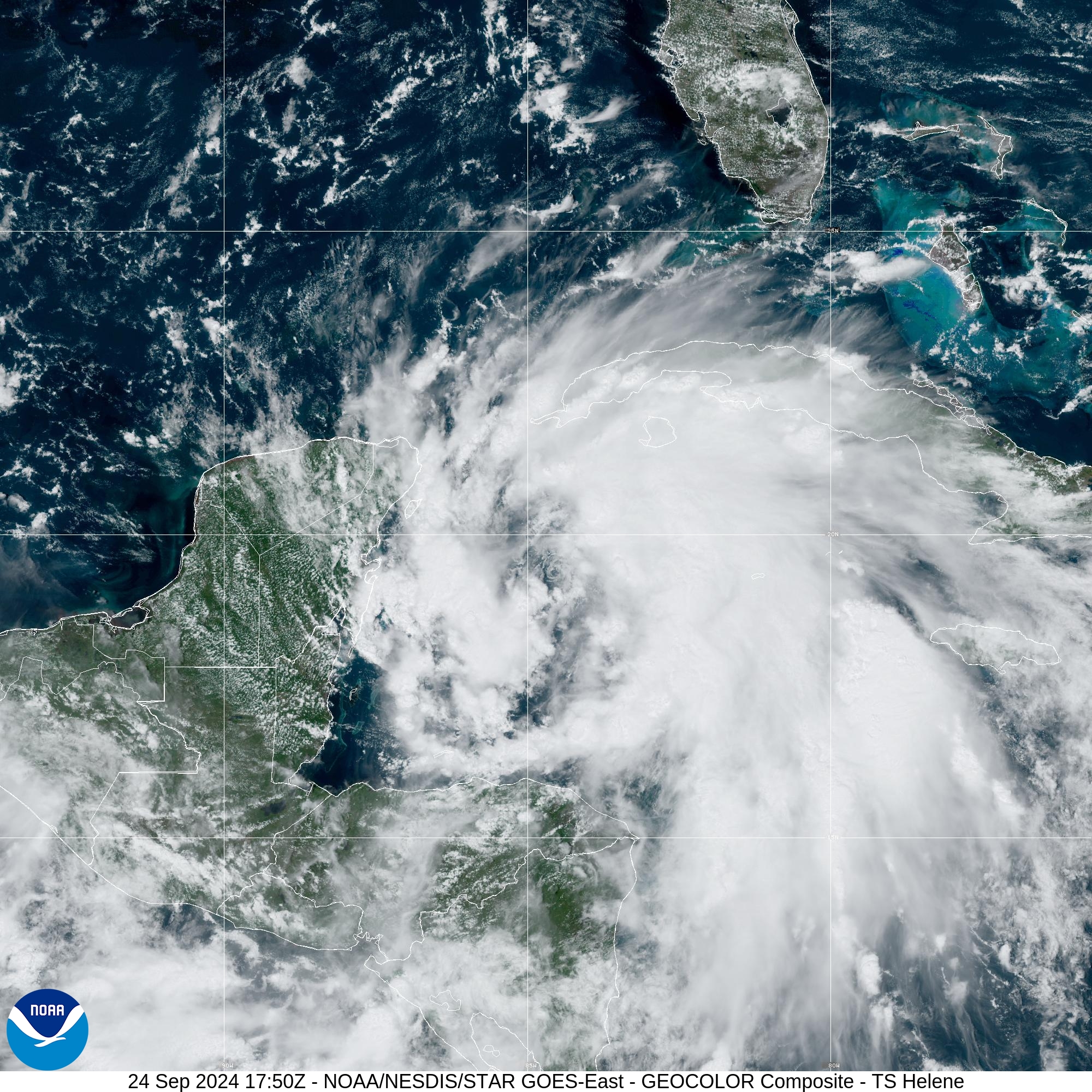What we’re watching: Weekly disaster update, September 23

We know all too well that disaster can strike anytime, anywhere in the world. Some disasters make headlines; others do not. Here at the Center for Disaster Philanthropy (CDP), we monitor the status of disasters worldwide and compile a list of the ones we’re tracking weekly, along with relevant disaster-related media coverage.
Here’s what we’re watching for the week of Sept. 23, 2024.
Special Announcement
During the Clinton Global Initiative 2024 Annual Meeting on Sept. 23, a group of donors and partners announced that it is channeling at least $2 million in emergency funds and other support to vetted networks of Sudanese responders by the end of 2024 as part of a new Commitment to Action. The Coalition for Mutual Aid in Sudan also pledged to draw attention to the humanitarian crisis and mobilize an additional $4.5 million or more in contributions to expand the reach and capacity of Sudanese responders through 2026.
For more information about Sudan, see CDP’s Sudan Humanitarian Crisis disaster profile.
New or Emerging Disasters
Hurricane – Florida: Tropical Storm Helene formed over the northwestern Caribbean Sea on Sept. 24. It is expected to intensify into a major hurricane this week before making landfall in Florida.
The storm is on track to move into the eastern Gulf of Mexico on Wednesday or Thursday. Current predictions have Helene making landfall somewhere between the Florida Panhandle and Tampa, areas that have been severely hit by hurricanes in recent years.
CDP maintains a 2024 Atlantic Hurricane Season disaster profile.
Hurricane John – Mexico: In another example of rapid intensification, Hurricane John increased quickly from a tropical storm to a Category 3 hurricane. It made landfall on Sept. 23 south-southwest of Marquelia in Guerrero, Mexico, with winds of 120 mph. While John weakened immediately after landfall, it was expected to bring up to 12 inches of rain by Sept. 26.
Flooding – North Carolina: Tropical systems do not need to become powerful named storms to do significant damage. Potential Tropical Cyclone Eight dropped up to 18 inches on Carolina Beach on Sept. 16. The rain triggered flash flooding, trapping people in their homes and blocking roads, before moving inland to South Carolina. The impact was particularly severe for coastal communities, and at least one person died. According to AccuWeather, the financial impact may be as high as $7 billion.
Flooding – Japan: Heavy rains in the Ishikawa Prefecture in Japan on Sept. 20-21 led to severe flooding. Rainfall amounts included 12.5 inches in Wajima City and almost 9 inches in Suzu in 24 hours.
On the morning of Sept. 21, 4.72 inches fell in Wajima City, the highest amount since record-keeping began in 1929. At least seven people were killed; 10 are missing. The rains led to 12 rivers breaching their banks, several landslides and severe flooding, and almost 50,000 people evacuated. This is the same area that experienced a 7.6M earthquake on Jan. 1.
Wildfires – Portugal: Seven people have died, including four firefighters, and almost 120 were injured as wildfires raged out of control in northern Portugal. The fires began on Sept. 14, and by Sept. 18, thousands of firefighters were fighting over 100 fires, many deliberately set. A “state of calamity” was declared by Prime Minister Luís Montenegro.
The affected land mass grew quickly, spreading over eight miles and encompassing about 175,000 acres. This created the fourth-largest burned area in the last decade. Emissions (the highest ever for September) spread to Spain and France this past weekend. A complete count of damaged properties is not yet available, but dozens of homes have been destroyed. The area contains about 210,000 homes.
Previous/Ongoing Disasters
Flooding – West and Central Africa: Ongoing floods have led to a crisis in West and Central Africa. More than four million people in 14 countries have been affected, with hundreds of thousands of people losing their homes. At least 1,000 people have died. Many of these countries were already at risk for extreme hunger, which the displacement and loss of crops will exacerbate.
At least 1.5 million people in Chad have been affected across all 23 provinces. Nearly 750,000 acres of crop land have been destroyed, along with 164,000 homes.
In Mali, nearly 30,000 buildings have been destroyed and 64 people killed as the country has experienced 374 flood incidents since the rainy season began in September.
In Nigeria, Save the Children reports that with three million children out of school, there is an increased risk of child marriage, kidnapping, malnutrition and other health concerns.
Billion-Dollar Disasters – United States: As of Sept. 10, there have been 20 separate climate and weather disasters in the U.S. with losses exceeding $1 billion each. At least two more are under investigation, including Midwest flooding in June and Hurricane Debby in August. Other events, such as Hurricane Francine and the North Carolina flooding mentioned above, occurred after the last assessment was done and will also be evaluated. Through Aug. 30, 2024, the total impact of economic loss was $53 billion.
Mpox – Global/Congo: The Mpox emergency continues to grow, and a small mining town is currently the epicenter. The town of Kamituga, in South Kivu in the Democratic Republic of the Congo (DRC), sees five new cases daily. Kamituga’s rural and remote location means it is hard to spread information, track cases or even treat – no Mpox vaccines have arrived yet.
The DRC is home to 75% of the suspected cases in Africa this year, according to the World Health Organization (WHO). The WHO’s most recent update, released Sept. 22, 2024, said there are 29,342 suspected cases since January, with 25,757 in the DRC and 1,557 in Burundi. Of the 812 deaths among suspected cases, 806 have occurred in the DRC. Confirmed cases have been reported in all regions of the world.
Flooding – Central and Eastern Europe: Europe continues to be ravaged by floods.
Italy was severely affected by Storm Boris, with several areas suffering from heavy rain (11.8 to 15.7 inches), including the Emilia-Romagna Region. Hundreds of homes have flooded, as has agricultural land. This area was hit by a major flood in May 2023.
See more in our 2024 Central and Eastern Europe Floods disaster profile.
Extreme Hunger – Multiple Countries
This standing section will update readers on areas facing extreme hunger.
Afghanistan: In 2024, more than half of Afghanistan’s population will require humanitarian assistance. Afghanistan’s complex humanitarian crisis is among the most persistent and severe. Millions of Afghans endure the consequences of four decades of conflict, poverty, repeated disasters and an economic downturn. Due to the impact of Taliban rule, this is particularly devastating to women and girls.
According to the World Food Programme, “12.4 million people have acute food insecurity [and] 1 in 4 Afghans do not know where their next meal will come from.” They say that at least three million people “are on the brink of starvation.”
CDP maintains a disaster profile on Afghanistan’s Humanitarian Crisis.
CDP resources include:
- Our Global Hunger Crisis Fund supports recovery from hunger and famine worldwide.
- Our Famine Issue Insight explores meanings, statistics and levels of hunger definitions.
- Our Nutrition Issue Insight looks at the impact of the lack of food on a person, as well as food and nutrition needs after disasters.
In addition to the disasters listed above, we actively monitor the following disasters or humanitarian emergencies. For more information, see the relevant disaster profiles, which are updated regularly.
Upcoming webinar
Oct. 10: Disaster risk reduction: How philanthropy can empower a resilient future

What We’re Reading
- See the latest house in this Outer Banks town to fall into the ocean – The Washington Post: “Eight homes have now fallen into the sea in Rodanthe since 2020, and more remain vulnerable to higher tides and looming storms.
- EU warns deadly flooding and wildfires show climate breakdown is fast becoming the norm – Associated Press: “Devastating floods through much of Central Europe and deadly wildfires in Portugal are joint proof of a ‘climate breakdown’ that will become the norm unless drastic action is taken, the European Union’s head office said Wednesday.”
- Maui’s toxic debris could fill 5 football fields 5 stories deep. Where will it end up? – Honolulu Civil Beat:CDP grantee partner Honolulu Civil Beat highlights the challenges of dealing with debris and waste after a disaster. This is exacerbated in an island setting, especially one with multiple environmental and cultural challenges like Maui.
- Climate change key driver of extreme drought in water scarce Sicily and Sardinia – World Weather Attribution: “Effective drought risk management in regions such as Sardinia and Sicily requires a sustained focus on long-term preparedness and adaptation. Investing in resilient infrastructure, water conservation strategies, and sustainable resource management is crucial to mitigating the impacts of drought.”
- Hurricanes cost more than you think. Here’s why that matters. – Grist: “In the days, weeks, and months after a hurricane like Francine makes landfall, a horde of public agencies and insurance companies try to figure out roughly how much they think the disaster will cost. That’s far more than just a number on the books: These estimates help state governments prioritize where to send aid and help kick-start insurance claims, allowing people and local economies to recover faster from disaster.”
- AP PHOTOS: Hallmarks of climate change seen in floods, fires and drought around the globe – Associated Press: In this stunning photo essay, AP photographers capture images of recent disasters around the world.
Something fun: Sounds like a movie to me! A cat named Rayne Beau (pronounced Rainbow) got lost this summer in Yellowstone National Park. Eventually, his family had to leave him behind. Two months later, they got a call that he’d been found just 200 miles from his home in Salinas, California – after traveling 900 miles by himself.

